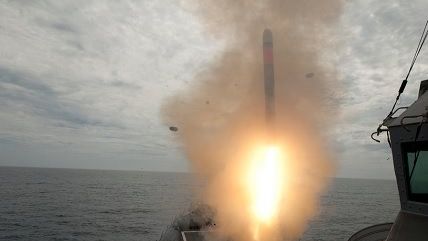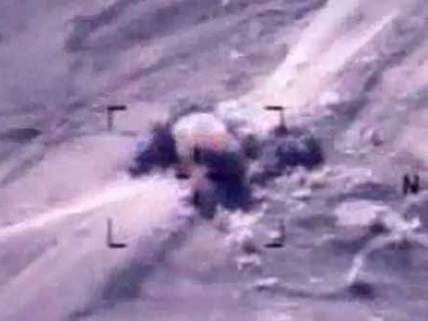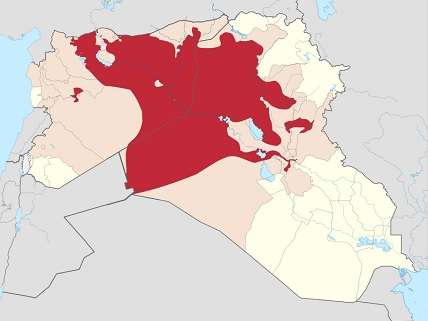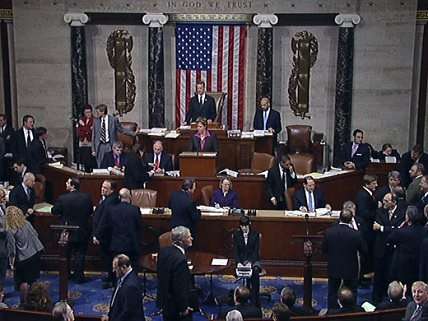Four Reasons Bombing ISIS in Syria Isn't Well Thought-Out
Bad idea


Last night, the Pentagon announced that bombing operations by the U.S. and its anti-ISIS coalition "partners" had begun over Syria. The air campaign in Syria against ISIS, the Islamic State of Iraq and al-Sham (or Syria), extends the U.S. war on the terrorist group-cum-self-proclaimed caliphate from Iraq, where an American air campaign began earlier this month. Barack Obama became the fourth consecutive U.S. president to order air strikes in Iraq.
President George Bush went into Iraq in 1991 during the Gulf War under the auspices of a U.N. Security Council resolution against the Iraqi invasion of Kuwait and with a resolution authorizing the use of military force (AUMF) from Congress. In the late 1990s, President Bill Clinton ordered airstrikes in Iraq in 1998, claiming Saddam Hussein had been thwarting U.N. weapons inspectors, sans Congressional authorization, arguing the strikes were a temporary measure covered by the War Powers Act. In 2003, under the pretext of problems with the treatment of U.N. weapons inspectors and using multiple U.N. Security Council resolutions to justify the action, President George W. Bush ordered an invasion of Iraq. He, too, had an AUMF, pinned on U.N. Security Council resolutions worried about weapons of mass destruction (WMD). This year President Obama reinserted the U.S. military into Iraq to combat ISIS.
Predictably, the U.S. war against ISIS, which claims territory in Iraq and Syria, has extended into Syria itself. The bombings in Syria are a bad idea, as is the wider war against ISIS, for a host of reasons.
1. This clusterfuck's a clusterfuck
Last year the U.S. wanted to bomb Syria over the Assad regime's alleged use of chemical weapons. Eventually, thanks to an off-the-cuff remark by John Kerry his Russian counterpart exploited, the Syrian regime disarmed under the watch of international inspectors. Although the U.S. did not identify regime change as a reason to bomb Syria last summer, neither did it identify regime change when it intervened with NATO in the Libyan civil war. That intervention ended with the Libyan leader, Col. Moammar Qaddafi, sodomized and killed by rebels in the summer of 2011, as protests in Syria began to transform into an armed insurgency, too. In the immediate aftermath of the Libyan civil war, the Obama Administration took credit for offing a bad guy and bringing democratic government to Libya. In September 2012, militants attacked a U.S. facility in Benghazi, and this year militants gave the local government a run for its money, pressing for political control, and oil revenue. A coalition of Arab nations conducted air strikes in the country.
Had the U.S. bombed Syria last summer, it would've likely strengthened the position of various rebel groups pressing for political control. ISIS has emerged as the strongest of these, despite being dismissed as junior varsity by the president (along with other "Al-Qaeda affiliates," like Boko Haram) back in January. Other rebel groups, including ones Congress authorized the U.S. military to arm (an idea the CIA has tried and dismissed), have tried to avoid conflict with ISIS. Several groups reportedly signed a "non-aggression" pact with ISIS (which other groups downplayed or denied), and even the Free Syrian Army, Washington's favorite rebel outfit, says it refuses to join the anti-ISIS coalition.
Washington and the region's focus has shifted to ISIS, a greater threat to security in the Middle East than the Assad regime, but the rebels in Syria haven't. In Libya, Western intervention felled the dictator quickly, but the country eventually became a battleground for competing proto-government militant groups. In Syria the country is becoming so without the felling of a dictator. Bombing ISIS in Syria may strengthen the Assad regime, other rebel groups, or a different set of jihadis looking to pick up where ISIS is left off.

2. It shifts responsibility away from governments threatened by ISIS
This morning CNN reported that the "U.S. and Arab partners bomb ISIS in Syria." Which Arab partners? Bahrain, Saudi Arabia, the United Arab Emirates, Jordan and Qatar, according to CNN, which cites an unnamed source, illustrating the snares of U.S.-led intervention. ISIS poses a threat to all those countries and others in the region—it has declared itself a Muslim caliphate, to rule over Iraq and the Levant, which stretches from Turkey to the Sinai. Yet those countries would prefer to hide in the background of a U.S. operation against ISIS, in part because they have fomented the very kind of virulent fundamentalist Islamism that fuels ISIS and groups like it in a bid to maintain power and influence.
In Iraq, U.S. airstrikes followed Iranian airstrikes against ISIS. Iran, like the U.S., is close to the Iraqi government. But the two countries refuse to cooperate and consider friends foes and vice-versa in the region, from Saudi Arabia to Syria. The threat ISIS poses to all these countries is real, and ought to be met by them. U.S. leadership in the anti-ISIS campaign in Iraq, and now Syria, where a slew of other countries have been involved over the last several years, only stymies the possibility of self-interested coalition-building, the strongest foundation for mutually beneficial international relations.
U.S. disregard for the regional actors, like Iran and Russia, that have been involved in the very real "war on terror" in Syria, isn't helpful to regional stability, either. Syria said the U.S. informed its representative at the U.N. before bombing of Raqqa, the Islamic State's capital in Syria, began. Try as U.S. military planners may to not allow the bombing campaign to help the Syrian regime's strategic position too much, any effective campaign against ISIS will do so. It's counterproductive to deny that reality, and to insist on replaying Rocky IV rather than engaging Russia on the issue.

3. There's no Congressional authorization
The argument that U.S. actions in Iraq are covered by the post-9/11 AUMF against al-Qaeda and associated forces ought to rejected. ISIS broke off with al-Qaeda and challenged its authority—claiming itself a caliphate with dominion over all Muslims—very publicly. ISIS began as an al-Qaeda affiliate in Iraq before crossing over to join the civil war in Syria and eventually challenge the local al-Qaeda affiliate there. By the time it returned to Iraq it was the Islamic State in Iraq and al-Sham, challenging terrorist groups and governments across the region. ISIS has as much to do with 9/11 as Iraq did in 2003. Even George W. Bush, whose administration tried to link Saddam Hussein's Iraq to 9/11, didn't try to use the 9/11 AUMF for the Iraq War.
In the end, the 2002 AUMF for Iraq didn't mitigate the disasters of that war. The weapons of mass destruction used to justify the AUMF and UN resolutions were never found, and long after the Bush Administration declared "mission accomplished," the mission in Iraq continued to evolve to spreading democracy and nation-building.
Would an authorization for the use of military force in Syria make a difference? No. Even on a political level, while Barack Obama claimed he'd have voted against the Iraq War, he's surrounded himself by advisors—Joe Biden, John Kerry, et al—who voted for it. Congressional backers of the war claimed the Bush administration misled them, as if asking questions weren't their job. A declaration of war might work better, and would satisfy the strict reading of the Constitution. Perhaps asked to declare war on Saddam Hussein's Iraq, members of Congress would less easily ignore the gravity of their decision.
In the case of Saddam Hussein's Iraq and ISIS, U.S. military action certainly feels like a war. Wars demand aims. They can still fail to meet their goals, and wars are always destructive, but aimless engagements are ripe for prolonged war. Congressional authorization, at the very least, would set down the specific reasons for U.S. engagement and provide a record for future presidential candidates to relitigate or run away from.

4. It provides ISIS with more legitimacy, propaganda for recruitment, direct action
From Barack Obama to Tony Abbott to Rand Paul, the beheadings of multiple hostages by ISIS has been used as justification for the escalation of the anti-ISIS campaign. Yet in the very first ISIS video, the masked militant on camera blamed U.S. airstrikes in northern Iraq tied to the rescue of a religious minority besieged by ISIS for the beheadings. Whether the savages would have found another reason to slice heads off notwithstanding, ISIS draws its legitimacy from anti-Americanism. The same fuel that keeps kleptocratic regimes in the region in power is harnessed to keep ISIS' fighters aflame. In the comic book world of ISIS' leaders, a great final battle with the United States is welcomed, even if it means their very degradation. ISIS fighters can be killed, its leadership decimated, but their "martyrdom" will prepare the next generation of fighters.
The other regional governments' inability to act without the United States, meanwhile, will further strengthen ISIS' case for territorial sovereignty among those who matter, the residents of the territories being fought for. U.S. intervention, then, disincentivizes regional powers from acting against ISIS on their own while providing ISIS the kind of legitimacy that brings it closer to the level of the regional powers.
All the while there's no greater recruitment tool than the wrath of the United States, which can attract jihadis from the world over, to the battlefields in Iraq and Syria, and to attempt the kind of lone wolf-but-inspired attacks like the Fort Hood shooting or the Boston Marathon bombing that are then used by supporters of more intervention to argue for more intervention. The excitable Sen. Lindsey Graham (R-S.C.) recently implored President Obama to do something about ISIS "before we all get killed here at home." We're at no risk of that, as the Obama Administration acknowledges, but the kind of shoot first, ask questions later attitude displayed by politicians like Graham just might.
Editor's Note: As of February 29, 2024, commenting privileges on reason.com posts are limited to Reason Plus subscribers. Past commenters are grandfathered in for a temporary period. Subscribe here to preserve your ability to comment. Your Reason Plus subscription also gives you an ad-free version of reason.com, along with full access to the digital edition and archives of Reason magazine. We request that comments be civil and on-topic. We do not moderate or assume any responsibility for comments, which are owned by the readers who post them. Comments do not represent the views of reason.com or Reason Foundation. We reserve the right to delete any comment and ban commenters for any reason at any time. Comments may only be edited within 5 minutes of posting. Report abuses.
Please to post comments


Hillary Clinton says, "What difference at this point does it make?"
1) re: 'Clusterfuck'
the argument seems to be, "Its unclear what attacking ISIS will mean for Syria"
Sure. But that doesn't mean hitting them won't get them out of Iraq, where they are a more pressing problem for our 'allies' there.If the case is a larger 'getting involved in the Syrian revolution is a bad idea', i think that is a stronger point. But that doesn't say much for/against just bombing this shit out of ISIS in Iraq, necessarily.
2) "it shifts responsibility"
Yes. because that's actually the main point. The US is intervening in effort to prevent a widening Sunni/Shia conflict which will draw in regional powers into a growing proxy war. Thats actually part of WHY we're doing it - not a reason against it. The case above seems to be "Let Iran annex iraq and let its military roll across to Syria". I'm not sure that's considered 'a good idea' in the Pentagon.
3) "No congressional authorization"
Congress authorized Iraq 2003. did that make it a better idea?
4) ""U.S. intervention...provid(es) ISIS the kind of legitimacy that brings it closer to the level of the regional powers."
They declared their 'caliphate' following mass-executions of locals. I'm not sure JDAMS being dropped on them provides and tacit acknowledgement to claims of sovereignty. The only reason they havent been wiped out by neighbors is exactly point #2 - the fear that Iranian/Shiite reprisal would result in a widening conflict.
Regarding number 3 - process matters. It matters that the separation of powers is followed. Politicians in the White House and in Congress should have to answer to the public when things go sideways and they voted to authorize it. The 2003 resolution was a bad idea - but it ended up costing Team Red the House in 2006, and the trifecta by 2008 (although by 2008 the economy was probably a bigger factor). Obama's actions now will lead future executives to completely ignore the war powers described in the Constitution.
I agree.
Its just a 'general criticism' and not one specific to Syria more than Libya or anything else.
I think its a tremendous irony that Obama has himself to blame for this situation; he campaigned on his own 'vote against war', and now refuses the opportunity for anyone else to do so.
I appreciate process, too, but sometimes, they can even screw that up.
'merica might be a freer place if Dubya had gone to Afghanistan without an AUMF.
Obama is still using that AUMF to justify domestic surveillance by way of the NSA, and he used it to justify assassinating an American citizen, too.
Also, there's little question but that Obama would get whatever authorization he asked for, at this point, too. I'm all for calling Obama out for not getting the authorization, don't get me wrong...
But my objections to what he's doing in Syria aren't just a matter of procedural issues. What he's doing wouldn't be in the interests of American security--even if he'd dotted his constitutional i's and crossed his constitutional t's, he'd still be wrong about this.
Process shmocess - this a monumental fuck up in the making. Our weak sister asshole for a president is going to war to help TEAM BLUE hold on to the Senate. The moron TEAM RED base will applaud the fact that we are finally bombing someone.
In the end the only thing that is going to happen is some ISIS assholes and a whole lot of civilians are going to get killed. ISIS will come out of this looking invincible.
Going to war is about getting as medieval as possible on those you have targeted for termination. You do not stop until the threat on gone. Otherwise stay home.
ISIS has killed a few American Journalists. That sucks. That is not a reason to go to war. We should end our dependence on Arab oil as much as possible and get the hell out of that dystopian shit hole called the Middle East.
" this a monumental fuck up in the making"
Don't be too negative. US is in for yet another thrashing by an insurgency, and if we're really lucky, ISIS will take down a few of America's allies in this adventure - Bahrain, Saudi Arabia, the United Arab Emirates, Jordan and Qatar. Maybe a few more bastions of liberal democracy.
"Those countries would prefer to hide in the background of a U.S. operation against ISIS, in part because they have fomented the very kind of virulent fundamentalist Islamism that fuels ISIS and groups like it in a bid to maintain power and influence."
As long as people keep missing one of the best reasons why bombing ISIS in Syria is a mistake, I'll keep pounding on what they're missing. ...that's as close to an apology for being redundant as you're gonna get.
The reason "those [Sunni] countries prefer to hide in the background of a U.S. operation--against ISIS [in Syria]"--isn't because they fomented fundamentalist Islam; the reason they're reluctant to go after ISIS in Syria is because ISIS is actively engaged in fighting those countries' biggest regional threat--and that threat is Iran.
Iran sees Assad's survival as crucial to its own security. Iran has given more than $15 billion to Syria since the fighting started. Syria is rife with thousands of Iranian backed Hezbollah, fighting against the Syrian rebels. Iran has sent thousands of Iranian Revolutionary Guard into Syria to fight ISIS and the rebels--some of whom are, reportedly, now wearing Syrian uniforms.
http://en.wikipedia.org/wiki/I....._Civil_War
Despite how terrifying it is to see journalists get their heads cut off, ISIS is not the primary security threat to "those [Sunni] countries" you mentioned, Ed. Those countries' primary security threat was, is, and remains Iran. Just for the record, Iran is a much greater threat to American security than ISIS, too!
Either Barack Obama's strategy--of attacking Iran's enemies in Syria for the benefit of Iran--is so smart, that even Iran's enemies in the region don't understand it, or Barack Obama has no idea what he's doing in Syria any more than he knew what he was doing when he did all of the other stupid things he's done.
I don't know. Despite 30 years of chanting "Death to America" Iran hasn't actually attacked us. They haven't even launched any terrorist attacks from US soil. Sure, they wage covert war against Israel in Lebanon, but that's not really our business, is it?
I'm not saying Iran's a great country that should be our ally, but they do have a stable government and are capable of controlling their crazies.
ISIS, on the other hand, is the crazy.
I haven't noticed Iran beheading any US citizens lately, either.
Iran has a nuclear program and a long range missile program that can already launch satellites using multistage rockets.
The USSR didn't directly attack the United States during the Cold War, but who would say that means they weren't the biggest security threat to the United States?
The USSR had the capacity to nuke every city in America, but not the stated intent to do so as soon as they got the chance.
If ISIS had the capacity, they would do so, unquestionably.
They will do anything they have the capacity to do, without restriction. That should be apparent. Our goal should be to make sure they never get the capacity.
Iran has the capacity to do plenty of damage, but I am less certain about their willingness to use it.
Backing Assad is not what I consider a threat. Hezbollah hardly even does anything anymore.
You know who else didn't think through a military action before engaging the enemy...
It wasn't Ronald Reagan.
Ronald Reagan thought it through and realized that getting involved, directly, in a war with Syria failed the cost/benefit analysis--even after Syrian affiliated elements (that coalesced into Hezbollah) attacked the United States directly in 1982.
It wasn't George H.W. Bush, who saw this kind of threat coming from a mile away--and purposefully resisted the urge to invade Iraq specifically because it would decrease pressure on Iran (and Syria) in the region!
Clinton had ample opportunity to move against Syria, but he didn't, and you know why? Because he thought it through!
It really wasn't George W. Bush either. Even in the throes of his Reverse Domino Theory hysteria, he had the opportunity and backing to topple Syria--but he thought it through and decided the costs outweighed the benefits.
Yeah, if you're keeping score, that makes Obama dumber than every president before him since Carter at least.
I was thinking more along the lines of, "You know who went WAY deep into the Eastern front and wasn't ready for winter...."
THANKS FOR RUINING IT. KEN.
hope you're getting some biking in. You STILL haven't told me what your scooter is! Shiny side up...
I've been on a little 250 lately.
I'm getting a FZ-07.
Do you know who else always ruined it?
Lincoln?
Rocky V? Although I agree replaying Rocky V in any way shape or form is a bad idea, I think you meant Rocky IV. That's the one where he single handedly wins the cold war by beating the shit out of Dolph Lundgren.
Or Rocky VII: Adrian's Revenge.
That intervention ended with the Libyan leader, Col. Moammar Qaddafi, sodomized and killed by rebels in the summer of 2011...
I hadn't heard that part before. What possesses a person to do that?
Islam.
It has been reported that they did it to our Ambassador in Lybia as well.
It happens either right before or right after they got killed by the mobs.
I thought he was sodomized with a knife. On the video you can see someone come up behind him and shove a knife right up his ass.
group cum
I've seen that video.
I have no idea what Obama is hoping to accomplish.
Apparently bombing Syria is supposed to cause a breakout of rampant Western Liberal Democracy. We tried destabilizing all the region's governments, and that didn't work, so let's try dropping explosives on them, maybe that will help.
Cause nothing breeds peace and stability like dropping bombs on people, right? That couldn't possibly lead to ever more psychotic radicalism, right?
I know Al Qaeda has been after us for a long time, but I don't know whether some of these ISIS rebels were planning attacks against the U.S. before. They were mostly concentrated on fighting Assad...
But I can't imagine those Syrian rebel groups aren't trying to think up some way to retaliate against Americans now. ...and how could opening up a new front in the war on terror unnecessarily be a good thing for American security?
The net result of the Arab Spring has been to pour fuel on the fucking fire.
Not one stable democratic government has emerged from it. Only more crazies.
Fuck you fucking progressive peace-tards who thought that America's support for Arab dictators was the problem. We got rid of the fucking dictators and all we got was more terrorism. Thanks a bunch, assholes.
I don't understand what you thought was going to happen.
Revolutions are a messy business; everybody knows that.
We weren't going to get less terrorism by having dictators in charge. It was never going to get better so long as the dictators were in charge.
And, as far as more terrorism goes, is it anti-American you're talking about?
I'm still not convinced that ISIS presented any significant threat to the U.S. security. I don't think the Rebels in Syria presented any significant threat to U.S. security either.
The terrorist threats that have emerged over there (much like ISIS) seem to emerge as a result of what the United States does over there--not because any dictators were overthrown.
There may only be one thing that inspires violent resistance more than a local dictator--and that's a foreign invasion and occupation.
"The terrorist threats that have emerged over there (much like ISIS) seem to emerge as a result of what the United States does over there--not because any dictators were overthrown."
Sort of like a third-party sticking a nose in a financial transaction between two parties, I'm beginning to think that any outside 'do-gooder' interference in a nation's (or culture's, or tribe's) dispute is bound to make things worse.
It's like the drug war.
Wasn't it Daryl Gates' ingenious idea to invent SWAT and invade South Central LA like an occupying army?
Ingenious! ...and what did that get us?
The Crips and Bloods became heavily armed in response and spread all over the country, ushering in a new era of gang violence like we had never seen before.
One of the best arguments against authoritarianism is: It doesn't work! ...and if you thought it was hard for a local dictator to keep everyone in line (often why they become dictatorships), just wait 'til an outsider tries.
..."and if you thought it was hard for a local dictator to keep everyone in line (often why they become dictatorships), just wait 'til an outsider tries."
Further, WE claim not to use the tactics dictators *require* to keep the populace under control.
Maybe Obo can make a speech and promise to extend O-care to 'em! Right after he nukes someone's mom.
Change presidents, that'll fix the problem!
Shuffle the chairs around...
They might have had an argument about changing presidents if Obama hadn't actually been a warmonger.
We didn't need a change of presidents; we needed a change of strategy.
I wish we could get a free trade agreement with Iran. I wish our relationship with Iran were just like our relationship with China. If only we had the level of trade with Iran that we do with China, Iran would be a lot more worried about our trade relationship than they were about building nuclear weapons, that's for sure.
That is not going to happen until we get a new party. Both TEAM RED&BLUE; are progressive. So either the independents figure out a real workable platform that does only demands less government, we will continue our march towards a brave new world order.
The change of strategy we needed was to go back ot Bush I's policy of stability and containment.
It's not our business to decide what form of government the Arabs have.
Barack Obama may actually bring peace to Syria.
...by uniting all the Syrians in opposition against us!
Our president really is a retard.
Fuck you fucking progressive peace-tards who thought that America's support for Arab dictators was the problem.
I still think that was a neocon thing.
The progressive peace-tards wanted to blame American interference--neocon wars specifically.
They were both right, and they were both wrong.
Dictators throughout the Muslim world really where the problem, but necons launching invasions and occupations to depose dictators wasn't the solution.
Neocons like George W. Bush launching invasions and occupations to depose dictators wasn't the solution, but installing a progressive war-hawk president like Barack Obama wasn't the solution either.
Both right.
Both wrong.
Welcome to our incompetent world.
Given that getting rid of several Arab dictators has NOT produced any improvement, I cast doubt upon the belief that the dictatorships were ever really the problem at all.
That, IMO, was a fantasy that flattered our intellectual beliefs about democracy.
You know, Mubarak was saying all along that without him, the Muslim Brotherhood would be in charge. Turns out he was totally right about that.
Assad was saying that without him, the jihadists would be all over his country. Apparently he was right too.
Six years of Obama the peacemaker who was going to solve our all problems by withdrawing America from the middle-east and the middle east is a bloodier mess than ever. The Jihadists are more powerful than ever. They just changes their name from Al Qaeda to ISIS. It's the same people with the same agenda. And now they control territory.
Shut down 4Chan. Fuck you.
my best friend's aunt makes $69 an hour on the computer . She has been fired for 9 months but last month her payment was $15485 just working on the computer for a few hours. visit the site....
???????? http://www.netjob70.com
Are you kidding? It's very well thought out. It serves the interests of the governing US party, the US military, and well-connected military hardware suppliers very well!
my friend's sister makes $60 hourly on the internet . She has been out of work for 6 months but last month her pay check was $19915 just working on the internet for a few hours. you can try this out.............
http://www.Works6.com